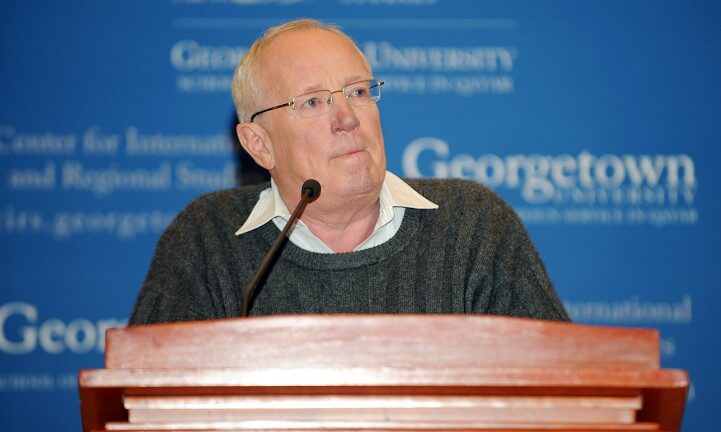American Studies, Dialogue Series, Race & Society, Regional Studies
Robert Fisk on Western Journalism and the Middle East

Robert Fisk, award-winning journalist and Middle East Correspondent for The Independent newspaper, gave the annual faculty-appointed Distinguished Lecture on April 20, 2010 on the subject of “State of Denial: Western Journalism and the Middle East.” GU-Qatar student Amna Al-Thani introduced Fisk to a capacity audience of 800 guests at the Four Seasons Hotel in Doha.
Fisk began by noting that on September 11, 2001, he was contacted by various news agencies who repeatedly asked him “who did it?” This, he said, was very telling of the state of Western journalism as they would not ask the obvious question of “why did this happen?” Fisk argued that “when you have an ordinary crime on the street, the first thing the police do is look for a motive. But when we had an international crime against humanity in New York, Washington, and Pennsylvania, the one thing journalists were not supposed to do was look for a motive.”
In today’s terror driven discourse, Fisk said, delving into the background historical reasons for why such attacks happen is considered synonymous with an apology for terrorist activity. This is challenging because it would open up a problematic discourse that questions the relationship between the United States, the Arab world, and Israel.
In Western journalism, Fisk argued, “what we were confronting, especially in the United States, was the parasitic, osmotic relationship between journalists and power.” Because the United States administration refers to the Israeli “occupied territories” as “disputed territories” and the Israeli “wall” is referred to as a “security barrier,” this language is picked up by the popular press and becomes the sanitized language of journalism. “By failing to use the real words, we de-semanticize the conflict,” said Fisk. “Through our journalistic cowardice, we make it easier for those who suffer to become the aggressors and those who are the occupiers to become the victims,” he argued. Journalists become complicit in conflicts when they subscribe to this type of reporting.
The worst example of this sanitization of conflict is television, where producers will not allow scenes of death or violence, thus concealing the reality of war from the public. Viewers of television in the West are not given the opportunity to see for themselves the effect of wars. Fisk argued that “our leaders, all of whom at the moment have zero experience of real war – the journalists do, but not our leaders in the West – they are able to present to the public war as a bloodless sandpit, war as something primarily to do with victory and defeat rather than death.”
Currently, Fisk argued, there is a wall of fortresses that divide the world into West and East. There are British, US, and Western European military posts in Afghanistan, Iraq, Tajikistan, Turkey, Jordan, Egypt, Algeria, Yemen, Qatar, Bahrain, and Saudi Arabia, as well as in a variety of other strategically located regions. “It’s a kind of iron curtain across the Middle East,” he said.
Western governments say that they want to export democracy, but, Fisk argued, the voices on the other side say they want nothing more than justice. Currently, the enemies of the Western world are predominantly Islamist. He said that “we don’t even largely reflect upon what I suspect is one of the principle frustrations that exist in this region: that Muslims have kept their faith and we have not.” He continued by saying, “what has happened is that a people who have kept their faith are now largely dominated socially, economically, politically, and, usually, militarily, by a people who have lost their faith. How do you explain that to yourselves?”
In conclusion, Fisk said: “I think the West should always be encouraged to send its teachers, and its educators, its builders, its engineers, its bridge-builders, and its scientists to the Muslim world, to learn as well as to help and teach. But, militarily, we have no business being in the Muslim world.”
Earlier in the day, Fisk was invited to the GU-Qatar campus to speak informally to a group of faculty, students, and staff. He answered questions related to the effects of technology on journalism.
A prominent journalist and the Middle East Correspondent for The Independent in the UK, Robert Fisk has won numerous press awards for his work including being named the British International Journalist of the Year seven times and receiving the Amnesty International UK Press Award twice. He has lived in the Middle East for over 30 years, and has reported on the 1979 Iranian revolution, the 1982 Israeli invasion of Lebanon and the Sabra and Chatila massacre, the 1991 Persian Gulf War, the 2003 invasion of Iraq and the war in Afghanistan. He is one of a few western journalists to have interviewed Osama bin Laden, which he has done three times, and is also a best-selling author, whose books include The Great War for Civilisation: The Conquest of the Middle East and Pity the Nation: Lebanon at War. Robert Fisk holds a PhD in politics from Trinity College Dublin and holds 12 honorary degrees from other universities.
Article by Suzi Mirgani. Mirgani is the CIRS Publications Coordinator.